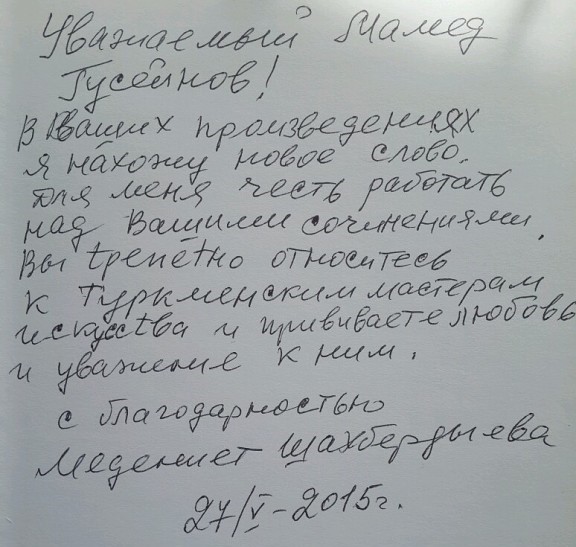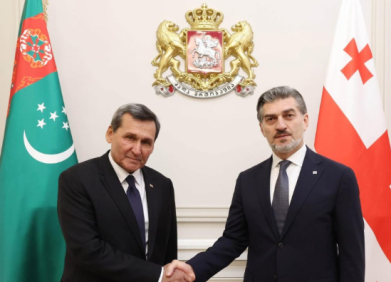Three "piggy banks" of composer Mamed Guseynov and one big love
20.02.2023 | 00:49 |Mamed Guseynov is a native of Turkmenistan, composer, public figure and laureate of prestigious creative competitions. For us, he is known, first of all, as a propagandist of Turkmen musical culture abroad, as the creator and art director of the Moscow International Art Festival "Sounds of Dutar" named after Nury Halmamedov.
At the age of 38, Mamed has achieved a lot. They write about him in the media, and there is a page on Wikipedia dedicated to his life and work. But today's interview will allow you to look at his story from a completely different angle.
― Mamed, you are a person who has completely "made himself", who boldly and confidently goes to his goal, not stopping at the successes achieved and not resting on the laurels of previous victories. It seems that you are an energizer working non-stop. So I want to ask, is there a button that turns on and off this "perpetuum mobile"?
― No, I don't work in non-stop mode 24 to 7. Still, I manage to alternate work with rest. But if something important, urgent suddenly appears, then, indeed, it happens that I regret that there are not 25 hours in a day. If work brings pleasure and satisfaction, allows you to realize yourself, then you do not feel tired. It happens that I can work all night long and not even notice how time has flown by. In general, it is impossible to engage in creativity continuously.
When you create a work, there comes a moment of emotional exhaustion, and it is necessary to switch to another type of activity in order not to fall into melancholy. I didn't think about it before, but now I do it intentionally: I alternate different types of work in order to competently give and receive energy.

― You have been holding the Nury Halmammedov International Festival in Moscow for several years. And as time has shown, this festival turned out to be a successful project. But at first there was no feeling that you were aiming at something too big, was there any fear that you would not be able to cope, and something might go wrong?
― I really like Goethe's quote "Regardless of what you dream about – start working on it! And then real miracles will begin to happen in your life!"
Of course, there were worries, doubts, and a million difficulties... but this is the seventh year this festival has been held. The list of participating countries is increasing. If in the early years there were only local musicians, composers and musicologists, now guests come from all over Russia, CIS countries, Japan, Europe and America. This year the festival will be dedicated to the 85th anniversary of Halmamedov. We plan to organize an extensive program of events with contests, concerts, scientific conferences, master classes.
― You were born and raised in Turkmenistan, studied in Ashgabat, St. Petersburg and Moscow. That is, they have absorbed the best musical traditions of Europe and Asia. Does this synthesis of cultures help in creativity?
― In my work, this fusion of East and West is manifested in the appeal to poetry, to musical forms and genres of different countries. For example, I have vocal cycles on poems by Magtymguly, Yesenin, Lermontov, Baudelaire… There is also a monopera "The Monologues of Magtymguly Pyragy" translated by Arseny Tarkovsky. Work continues on the opera "Solomon" based on biblical stories.
Many composers carry a cultural "mixture". And, of course, this leaves a positive imprint on their creativity.
I communicate and make friends with musicians from different countries. For example, in September 2022, I participated in the OperaFirst festival of the Caspian countries, where I personally met the outstanding composer of our time, Frangiz Alizadeh, this meeting and communication greatly influenced me. Now we communicate, exchange music, notes, ideas. I communicate closely and fruitfully with musicians from Turkmenistan.
I am proud that once my vocal works were performed by the luminaries of the Turkmen musical art - People's Artist of the USSR Medeniyet Shahberdyeva and People's Artist of Turkmenistan Roza Turayeva, and also, not so long ago, my music was performed by a string orchestra led by Tahyr Atayev and a magnificent violinist Bahram Dolyyev with pianist Bahar Annadurdyeva. By the way, they are laureates of the Sounds of Dutar festival. The organizing committee of the festival is proud of the discovery of such musicians for Russia.

I want to tell you one episode related to Shahberdyeva. At that time I was a student of the Russian Academy of Music “Gnessin”. On one of my vacation visits, I decided to show my compositions to the great singer. She invited me to the conservatory where she taught, and there I played them to her for a very long time. When she and I left the classroom, she approached a group of teachers and said: "I have just listened to Mamed compositions, and I realized that my heart is calm for the future of Turkmen music. His works inspire a desire to live and enjoy every day."
Later, on each of my visits to Ashgabat, the first phone numbers that I dialed as soon as the plane landed at the airport were Medeniyet Shahberdyeva and Roza Turayeva. Their words of support at that time were necessary for me and warmed my soul.
Today, my compositions are performed by various musicians, artists of the Bolshoi Theater, the Helikon Opera, but I don't feel the emotions that I experienced from the reviews of my compositions by two great Turkmen singers anymore. Probably because I was young then and was taking my first steps in the profession.
― You recently announced the establishment of the Turkmen regional branch of the Union of Composers of Eurasia. Can I find out more about this?
― The idea was literally in the air. The main goal of the Union of Composers of Eurasia is to gather like–minded colleagues from the CIS countries and beyond and continue the best traditions of the composer community. This process is logical and inevitable. SKE unites all CIS countries and some European countries, such as France, Italy, Spain, Greece. But the list can be continued. Thus, for European composers, this is a great opportunity to enrich their creativity with an oriental exotic note, and for Asian composers, it is a window to Europe.
We hope that our joint work with composers from different countries will be creatively productive. There are already results. And now we are working on a concert of chamber vocal compositions. We select a repertoire, invite performers, and rehearse.
Communication is important for a composer, and not only of a creative plan. When a composer, and any creative person, is absorbed in work, he does not notice either time or space, so there is a kind of falling out of society. And movement in society is necessary for realization. That is why there are creative unions. Communication between composers of different generations is also necessary. You can recall the story of Schubert, who lived on the next street with Beethoven, but did not dare to meet him because of his modesty. Although this meeting would be useful not only for Schubert, I think.

― You are the winner of many competitions. What gives you participation in creative competitions, the opportunity to gain recognition or the desire to become the "number one" in your field? Which competition do you value the most?
― Contests are needed in order, as they say, to look at the world and show yourself. While participating in competitions, concerts, festivals and creative trips, I found new friends and associates. Conquering each of the peaks requires strength and energy, as well as mental, emotional and creative investments. Therefore, it is impossible to say that one of the awards is my personal "Everest", and the rest are not so important. All of them, together, fill my three "piggy banks" under the names: creativity, impressions, acquaintances.
Contests do not always give an objective assessment of a particular musician. The winners of prestigious competitions do not always become outstanding musicians, and those who did not make it to the finals later gather full halls. The identification of talents and support from all these contests is what is important, and not just to hand over a prize and forget. At our festival "Sounds of Dutar" we allocate an annual scholarship, invite you to our concerts. So, in 2021, it was received by two orchestras and one soloist – Bahram Dolyev.
By participating in numerous contests, I found close friends. We not only cooperate, implement creative projects, but also make friends with families, congratulate each other on holidays, go to visit, send parcels.

― And what is your favorite holiday?
― The most favorite is the New Year. Why him? I see the meaning of this holiday in the fact that it should be celebrated with the family, with the closest people. And my family consists of my wife Darya and my son Dariya. Yes, we are not yet a "football team", but for me my "Dary" (Gifts) are a bulwark and a reliable rear. Dasha is also a musician by profession, an opera singer. It's great to live with an artist, you never get tired of uniformity, all the time she is in different incarnations on stage! And in vocal creativity, she tells me a lot.
She is a real combat friend who, in a difficult moment, can, as they say, feed cartridges and load. She is my like-minded person, understands me at a glance, supports me in all my endeavors, we are looking in the same direction. And our little son absolutely does his main "job" – pleases his parents.
― Is there one of your compositions that is your business card?
― This question should not be asked to the composer. Because there will be no adequate response. Let us recall at least Tchaikovsky's words about the ballet "The Nutcracker": "I carefully strained all my strength to work, but nothing came out except abomination." And shortly before the start of the production rehearsals, he wrote to his brother: "What if it turns out that The Nutcracker is disgusting...".
And for me, those works that I love and believe that they turned out are not popular. And those essays on which I did not spend any effort and time at all - the public is delighted with them, and they receive several tens of thousands of views with comments on the Internet. I don't understand anything!
And I get inspiration from my native land of Turkmenistan. The best and most beautiful of my works are those that, one way or another, are connected with Turkmenistan. In my compositions, I use a theme or motif that I remember from childhood, poems by Turkmen poets, I use Turkmen instruments or musical genres.

By the way, one of my awards, received in the 2009 composer's competition in Moscow for the best innovative work, is also related to Turkmenistan. I was awarded a prize for using the dutar techniques of playing native Russian folk instruments. And if any of my compositions is destined to become a "business card", then I am sure that it will be an essay related to Turkmenistan, the place where I was born and where my childhood passed.
Ayna Shirova











